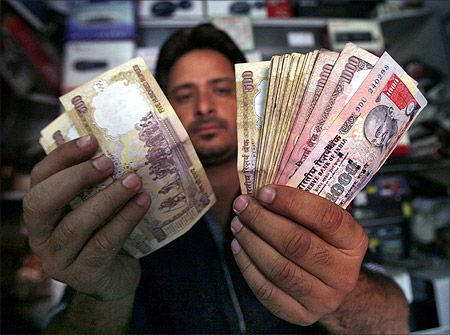 | « Back to article | Print this article |
For the first half of the current fiscal year, the fiscal deficit is down to Rs 3.79 lakh crore or about 68 per cent of the Budget estimates, notes A K Bhattacharya.
 For August and September, the Union government's Budget had recorded a revenue surplus. This is unusual.
For August and September, the Union government's Budget had recorded a revenue surplus. This is unusual.
A revenue surplus essentially means the government's revenue receipts are more than its revenue expenditure.
The government's revenue expenditure largely constitutes its interest outgo on past loans and payments for subsidies, salaries and for running existing schemes. It also includes its spending on defence services.
On the other hand, revenue receipts are of two broad categories - those coming from the levy of direct and indirect taxes and those that accrue from dividends and profits from state-owned organisations and the various fees and charges imposed on the provision of government services.
The conclusions are obvious. The government's interest payments, which at about 30 per cent constitute the single largest component of its revenue expenditure, have understandably seen no significant change.
But there is a decline in its expenditure on subsidies that account for over 15 per cent of the government's total revenue expenditure.
This is largely because of a drop in international crude oil prices - a gain that has been accelerated by linking petrol to market prices and rolling out the direct benefits transfer scheme reducing leakages and diversion of subsidised cooking gas cylinders to sectors not targeted to get such benefits.
On the revenue receipts side, the government has been reaping the benefits of its decision to raise taxes on petroleum products even as the international crude oil prices have declined and increase the indirect tax rates across many sectors in the last Budget.
Thus, for the first half of the current financial year, the government's revenue deficit is only about 68 per cent of the Budget Estimates for 2015-16, compared to over 91 per cent in the same period of 2014-15.
In absolute terms as well, the recovery is remarkable. Compared to a revenue deficit of Rs 3.45 lakh crore in April-September of 2014-15, this year it is now estimated at Rs 2.69 lakh crore in the same period.
It is this revenue account gain that has helped Finance Minister Arun Jaitley to spend a little more under its various Plan programmes, particularly on the capital account.
Also, Jaitley is not going to deviate from the fiscal consolidation path he had outlined while presenting the 2015-16 Budget, even though there may be some slippages in his revenues from disinvestment.
For the first half of the current fiscal year, the fiscal deficit is down to Rs 3.79 lakh crore or about 68 per cent of the Budget estimates. This is sharply lower than Rs 4.39 lakh crore recorded in the same period of last year or about 83 per cent of Budget estimates for 2014-15.
Jaitley now seems set to achieve the fiscal deficit target of 3.9 per cent of gross domestic product or GDP in the current year.
The challenges for achieving the stated goals of 3.5 per cent fiscal deficit next year and three per cent in 2017-18, however, are daunting. Three signals emerging from the current year's numbers so far are, therefore, worth noting.
One, the revenue gains in the current year have been largely driven by tax collections. Non-tax revenues will face a shortfall against the Budget estimates, particularly because of slow progress on the disinvestment front.
Tax collections will depend on economic growth, tax reforms and removal of irritants in existing tax laws. Next year's Budget, therefore, must focus on these areas if the goal of fiscal consolidation has to be achieved.
Two, the gains from containing revenue expenditure have so far been achieved mainly on account of a fall in international crude oil prices.
The advantage that Jaitley enjoyed in 2015-16 will not be there next year as crude oil prices are not expected to fall further over what they were in the current year. If anything, prices may go up pushing up revenue expenditure further. There is, therefore, greater and more urgent need for expediting further subsidies reforms in petroleum products and fertilisers.
Three, the increase in Plan expenditure on the capital account of about Rs 35,000 crore in the current year was clearly insufficient to give the much-needed investment push through government initiatives.
The government is likely to exceed this target this year as already over 60 per cent of this amount has been spent.
Given the banking sector's lending limitations because of their own capital constraints, the government has to prepare for increasing Plan expenditure on the capital account next year.
The gains achieved in the first half of the current year, therefore, are not an occasion for celebrations, but a reason for the government to strengthen its resolve for achieving further fiscal consolidation by rationalising taxes and cutting wasteful expenditure including that on subsidies, which should give it fiscal room for more capital investments.